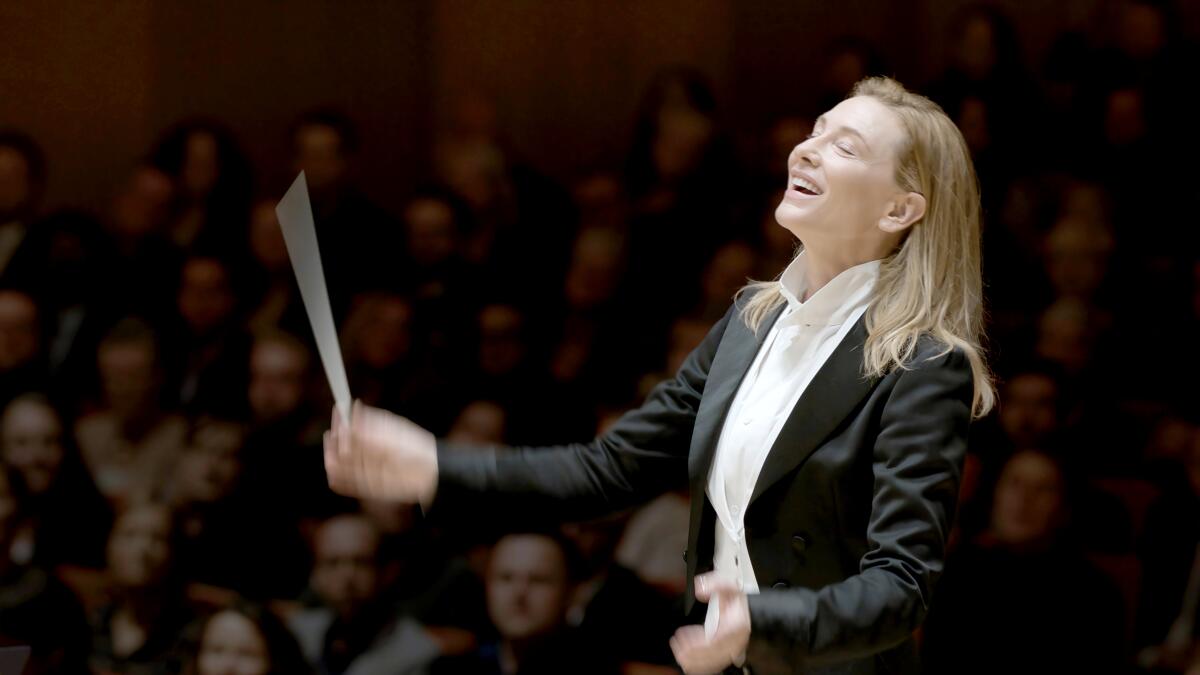Commentary: Oscar nominee ‘Tár’ brought conducting into the spotlight. That’s not good for classical music

Director Todd Field has gone through great pains, including on a podcast for The Times, to explain his great effort to get the world of classical music right in “Tár.”
A wealth of knowing chatter, gossip and the goings-on in the orchestra is meant to add to the film’s realism. Cunning clues abound, as in a conductor in the film, Andris Davis, being named after the real-life Boston Symphony Orchestra Music Director Andris Nelsons and the revered late British conductor Colin Davis.
There have been many fanciful feature films set in the milieu of the classical music world with many actors, including Rex Harrison and Yul Brynner, as charismatic star conductors. They, though, are charismatic movie actors just doing their thing. On the other hand, Cate Blanchett, in her role as Lydia Tár, attempts to show what it really takes to conduct an orchestra, let alone reveal what it might require and feel like for a women to become the music director of the Berlin Philharmonic, the most desirable job in the profession. Blanchett doesn’t, like all the others, just wave her hands around. She conducts.
Cate Blanchett, director Todd Field and composer Hildur Guðnadóttir break down the vital role classical music plays in the critically hailed ‘Tár.’
And now “Tár,” after raking up rave reviews and generating conversation along with a smattering of controversy, is collecting copious awards and nominations, including six for the Academy Awards. Who in the classical music racket wouldn’t want an Oscar contender drumming up attention for classical music? Maybe more of us than you might think.
A few musicians and critics have begun to speak out about “Tár.” Marin Alsop, a glass-ceiling-breaking conductor who studied with Leonard Bernstein, who created an institution to promote young women conductors and who is raising a child with her wife, was the partial inspiration for Tár; Alsop has taken umbrage with the film. A handful of music critics have pointed out some of what “Tár” gets wrong. Nevertheless, a feature film must be allowed the necessary licenses of fiction. The hard work and devotion of orchestra life is a lot less glamorous and a lot more boring in real life. Sort of like making a movie.
Even taking all that into account, though, the truth remains that underlying its veneer of authenticity, “Tár” happens to be a mean-spirited horror film with a classical music industry chip on its shoulder the size of the Hollywood Bowl. It resembles fake news more than fiction.
We’ve been there before. Remember “Shine”? The biopic about an Australian pianist with a schizoaffective disorder made a momentary sensation of Rachmaninoff’s Third Piano Concerto. Nominated for best picture in 1996, “Shine” delivered an Oscar to Geoffrey Rush for best actor and led to making pianist David Helfgott’s unfortunate recording of “Rach 3” a bestseller. But Rachmaninoff has survived.
So, too, will Mahler survive. A few excerpts of his Fifth Symphony, in performances said to be actually conducted by Blanchett (she studied conducting to prepare for the role) are distorted on the soundtrack beyond reason. The real conducting is obviously by the music editors. Every instrument sounds individually miked, and the balances done in the editing room meant to underscore a sense of massive egotism. The volume is extreme. The soundstage is massive. No concert hall sounds like that. The result is the orchestra standing in for a grotesque exhibition of power, as though it were a calculating film score, maybe meant as a reflection of Tár’s own controlling and out-of-control character.
The idea of creating a horror film around orchestra life does have a certain ghoulish charm. Ominous soundtracks can make or break a picture, and no more so than in horror. Think the often brilliant atonal scores of 1950s horror films or Martin Scorsese’s marvelously devious use of avant-garde classics in “Shutter Island.”
Field gets that in his application of barely perceptible, moody original music by Hildur Guðnadóttir. It subliminally primes you for the shock of hearing an orchestra blasting Mahler. The problem is we don’t know it’s a horror film until the end. I didn’t realize that the distorted Mahler we hear is what is supposedly going on in Tár’s head as the world around her falls apart. The soundtrack is meant, according to its mixer, to intensify Tár’s psychological revulsion, or misphonia, to noises — hardly a believable trait for one of the world’s most celebrated conductors.
“Tár” isn’t meant to be about classical music. Field has said that since it’s the study of a sexual predator, he made her a conductor, who he sees as an almighty musical god asserting her will over 100 exceptional musicians. Setting the story in the culture of the symphony orchestra is, to the general film-going public, exotic and hence intriguing.
Yet the classical world we’re presented with in “Tár” is full of tired, outdated clichés. The players of the Berlin Philharmonic choose their own music director, and it would not be one who talks to them like they were first-year conservatory students. Should those of us in L.A. not be offended by a Hollywood film cluelessly referring to the “Big Five” America orchestras while leaving out the Los Angeles Philharmonic, the biggest by all relevant measurements? The film opens with New Yorker writer Adam Gopnik interviewing Tár at a New Yorker talk, and when he brings up the so-called Big Five you wonder whether he reads his own magazine.
Writer-director Todd Field used ‘Tár’ as his opportunity to make a film about power starring Cate Blanchett as a character he’s been thinking about for a decade.
All the supposedly insider talk about legendary conductors and the rest sounds uncomfortably like how some of us used to carry on as nerdy pretentious freshmen. “Tár” trots out Antonia Brico as an extraordinary, pioneering conductor. Brico grappled with gender discrimination in her day, and despite conducting such top orchestras as the Berlin Philharmonic and New York Philharmonic in the 1930s, as well as the Los Angeles Philharmonic in 1930, her much-publicized return to the Bowl 45 years later did not go well.
Blanchett doesn’t help either, not when there are musicians of the extraordinary caliber of Mirga Gražinyte-Tyla and Susanna Mälkki. But the main thing is the music. When Rex Harrison flails about on the podium in the delicious Preston Sturges classic “Unfaithfully Yours,” from 1948, you hear wonderful results from a prerecorded studio orchestra expertly led. Even Yul Brynner in the goofy 1960 film “Once More, With Feeling!” is curiously believable because of the expert studio orchestra soundtrack. The music makes the conductor.
These comedies made plenty of fun of the classical music world at the time, parodying its exaggerated glamour but with a layer of warmth. Brynner’s manager — a character based on the impresario Sol Hurok (who, Isaac Stern quipped, speaks five languages and all of them badly) — is the butt of jokes but lovable all the same.
“Tár” is cold as ice. At a rehearsal, Tár smugly likens trying to conduct the players to standing on the podium with “a four-thirty-three trying to sell a car without an engine.” A possible translation is that she is stuck with meaningless silence, a callback to John Cage’s silent piece, “4’33”,” and even then the players are so hapless they can produce no juice. I’ve heard Simon Rattle rehearse the Berlin Philharmonic when he was its music director. That’s not how it works. He urged. They delivered big time.
When the film bases a character on a real person, it becomes downright vituperative. A major donor to Tár’s conducting program is a reptilian wannabe conductor named Eliot Kaplan, who looks like Gilbert Kaplan did in the early 1960s. Gil Kaplan was a Wall Street financier whose passion for Mahler’s Second Symphony got the best of him. After making a bundle, he dropped out of business and hired top conductors with whom he obsessively studied the symphony until he could half conduct it.
That he did with orchestras all around the world, always without a fee and usually as fundraiser for the players. I never reviewed him, because he was an amateur. But I knew him and liked him. Whenever Gil came to town, he wanted to meet and talk and talk and talk about Mahler. He couldn’t get enough. He created a foundation and supported Mahler projects. He surely did annoy some conductors. But he was a kind man who died seven years ago and who cared deeply about music and people.
Much attention has been given to the discovery of Sophie Kauer, who plays a young cellist, Olga, to whom Tár is socially attracted. We hear her play a little of Elgar’s Cello Concerto, and she is impressive. But Kauer is expected to channel Jacqueline du Pré, who was a legend of another generation. While “Tár” goes to considerable ends to be contemporary — Tár tools around Berlin in a Porsche Taycan, dresses with a sense of fashion and lives in a swell apartment — it does so in everything but the music.
What “Tár” gets right comes out feeling wrong, and what it gets wrong is just plain wrong. Without an exalted level of music, it simply doesn’t work. This is what $35 million, the budget for the film, buys to create the Berlin of “Tár.” It so happens, however, that the price tag for the Pierre Boulez Saal in Berlin, the magically enthralling space Frank Gehry designed for Daniel Barenboim’s inclusive West-Eastern Divan Orchestra, cost only a fractionally more 35 million Euros.
At one point in the film, Tár is awakened by her radio alarm. It is tuned to the classical station. She listens for a moment and recognizes that it is a performance by Michael Tilson Thomas, whose conducting she likens to “screaming like a porn star.”
That’s the last straw. Tilson Thomas’ recent L.A. Phil performance of Mahler’s Ninth Symphony at Walt Disney Concert Hall was one of the all-time great and least self-serving Mahler performances. It was music-making as matter of life and death from a beloved conductor, who announced that he had a life-threatening brain tumor well over a year before the film was released. Even if Tár’s tasteless remark may have been meant to show us more about her than MTT (and there is no way to know what was intended in a film that delights in enigma), it exemplifies the film’s petty tone.
The music advisor for “Tár,” John Mauceri, served as an assistant to Bernstein and is the founding conductor of the Hollywood Bowl Orchestra, which he led from 1990 to 2006. Field has said reading Mauceri’s “For the Love of Music: A Conductor’s Guide to the Art of Listening” proved an inspiration. Field has also spoken repeatedly about his own love of music, and none more so than for Mahler’s Fifth. But somewhere along the line in the making of “Tár,” love was left behind on the cutting room floor.
More to Read
The biggest entertainment stories
Get our big stories about Hollywood, film, television, music, arts, culture and more right in your inbox as soon as they publish.
You may occasionally receive promotional content from the Los Angeles Times.













